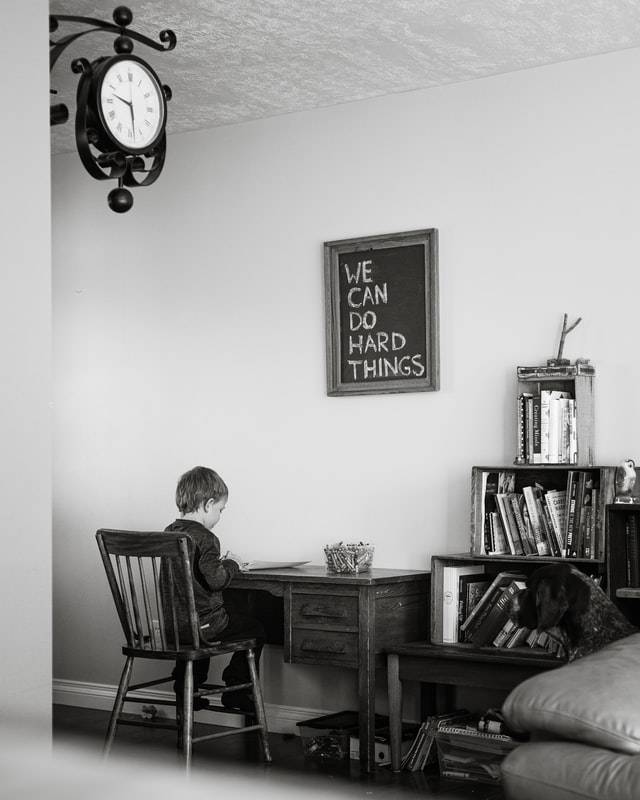The Power of Encouragement The word encourage means “to instill courage.” We are seeking to give children the courage to attempt more. To a young child, almost every experience is new. Learning to walk, to talk, or to ride a bicycle requires constant courage. By our words, we either encourage or discourage the child’s efforts.
Speech pathologists say that children learn to speak by mimicking adults, but that the process is enhanced if the adults not only pronounce the words clearly but also give verbal encouragement to the child’s struggling attempts to say them correctly. Statements such as, “That’s close, that’s good, yes,
great, you’ve got it,” encourage the child not only in learning the words at hand but also in developing future vocabulary.
The same principle is true in the child’s learning of social skills. “I saw how you shared your toys with Madison. I like that—life is much easier when we share.” Words such as these give a child that added inner motivation to go against what might be a natural desire to hoard. Or consider a parent who says to a sixth-grader, “Danny, I noticed that tonight after the game you were listening closely to Scott as he shared his feelings about his game. I was so proud of you for giving him your undivided attention, even though others were slapping you on the back as they walked by. Listening to people is one of the greatest gifts you can give them.” This parent is instilling in Danny the courage to develop the art of listening,
one of the most important arts in the field of human relationships.
Maybe you find it difficult to use encouraging word s. Keep in mind that one aspect of feeling encouraged is feeling good physically. Exuberance and vitality require energy; this means as parents we need to be in the best possible health physically,
mentally, emotionally, and spiritually. When we feel encouraged, we are better able to encourage our children. In two-parent households, the parents should encourage one another; if you’re a single parent, have trusted friends or relatives who will bolster your spirits and energy.
The greatest enemy of encouraging our children is anger.
The more anger the parent harbors, the more anger the parent will dump on the children. The result will be children who are both antiauthority and anti-parent. This naturally means that a thoughtful parent will do all in his or her power to assuage anger—to keep it to a minimum and to handle it maturely.
The writer of Proverbs is wise indeed: “A gentle answer turns away wrath.”2 The volume of a parent’s voice has great influence over a child’s reaction to what the parent says. It takes practice to speak softly, but we can all learn how to do it.
Also, when we are feeling tense with our children, we can learn to speak calmly, asking questions whenever possible, rather than issuing commands. For example, which of these statements would best encourage a child or teenager? “Take out the garbage now!” or “Would you take out the garbage for me, please?” When we try to encourage our children in a particular matter, they will more likely respond favorably rather than reject our ideas. Years ago a middle-school teacher in Minnesota did a remarkable thing. She asked her students to list the names of all the other students in the class, leaving a space between names.
Then she told them to think of the nicest thing they could say about each of their classmates and write it down. At the end of the period she collected these sheets and over the weekend,
she wrote the name of each student on a separate sheet and listed what everyone had said about that person. On Monday,
she gave each student his or her list.
As they began reading, they started whispering to each other, “I never knew that meant anything to anyone” or, “I didn’t know others liked me so much.” The papers were never discussed in class, but the teacher knew the exercise was a success because it gave her students such a positive feeling about themsel ves. Several years later, one of those students was killed in Vietnam. After his body was returned to Minnesota, most of his classmates, along with the math teacher, attended the funeral. At the luncheon after the service, the father of the young man said to the teacher, “I want to show you something,” and took a wallet out of his pocket. “They found this on Mark when he was killed. We thought you might recognize it.” Opening the billfold, he removed two worn sheets of notebook paper which had been taped, folded, and refolded many times. It was the list of good things Mark’s classmates had written about him.
“Thank you so much for doing that,” Mark’s mother told the teacher. “As you can see, our son treasured it.” One by one,
Mark’s classmates began to reveal that each of them still had their sheet and that they read it often. Some carried it in a billfold; one had even put it in his wedding album. One man said, “I think we all saved our list.”3




No comments yet
Be the first to share your thoughts!